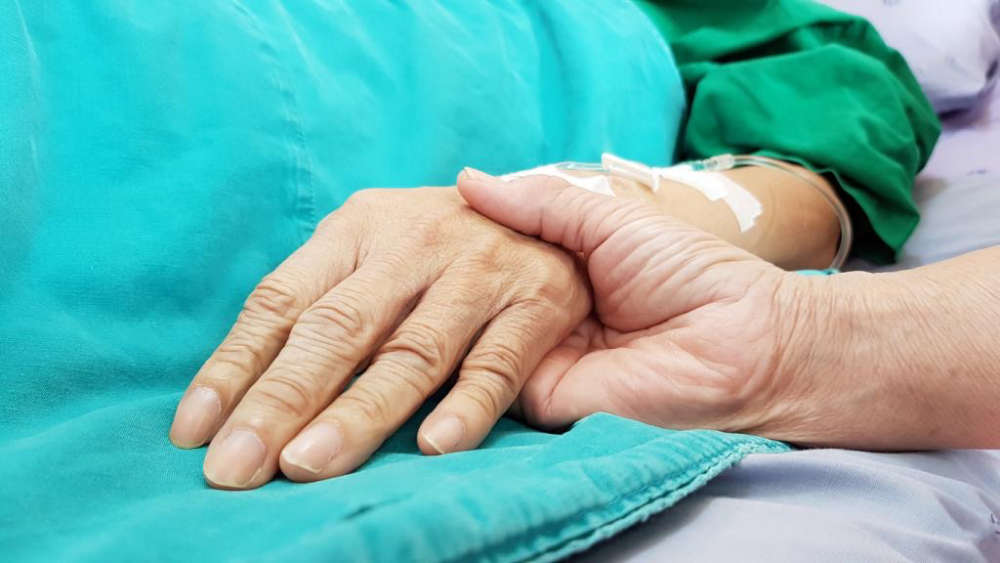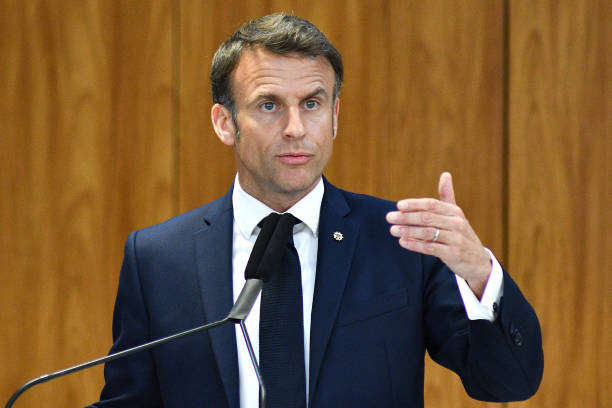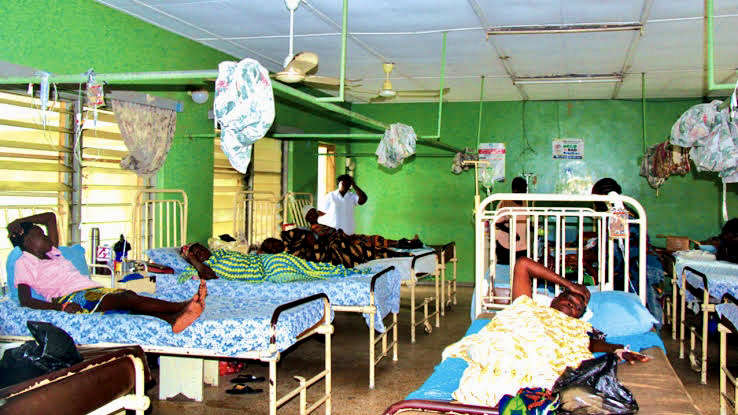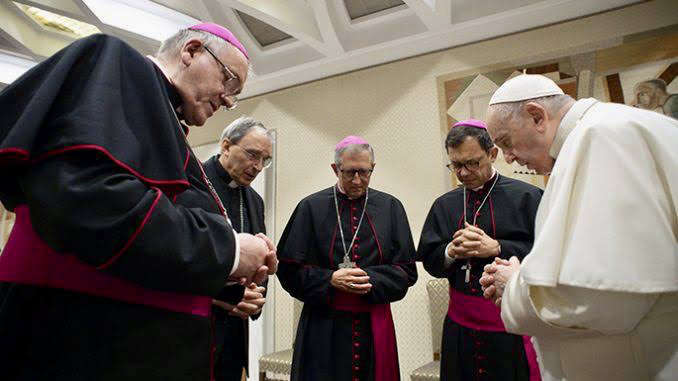
"Honestly, I sometimes pray to God to take him if he’s not going to recover,” says 34-year-old Boma (real name withheld), the only child of her 90-year-old father - a retired civil servant left in a vegetative state by a stroke he suffered nine months ago.
“My dad has had a stroke for eight months now that has left him incapacitated. He cannot speak, eat, or do most things. He is semi-conscious. Feeding him is a major issue. A tube is passed through his nose and stomach. TPN is administered sometimes through his veins, to provide nutrients to his body since we have to stop feeding him through tubes sometimes for the risk of sepsis. It’s very expensive to change these tubes every 6-8 weeks, buy consumables like diapers, wipes, and cotton wool, and then buy the drugs and vitamins needed to treat his bed sores”.
Like Boma, many Nigerians have considered medically assisted suicide, otherwise called Euthanasia, for their terminally ill family members who have been declared medically impossible to recover. But it appears far-fetched considering it is not legal in Nigeria to do so.
They suffer in silence, avoiding any involvement in murder or suicide in a religiously charged society like Nigeria.
However, on a global scale, medically assisted suicide is gaining momentum, with Belgium, the Netherlands, Luxembourg, Portugal, and most recently, Germany and Spain legalizing it.
Currently, France is considering a law that permits medically assisted suicide - what the French President, Emmanuel Macron, has termed ‘Aid in Dying’.
'Aid in Dying' in France
French newspapers, La Croix and Libération report that President Macron intends to propose a bill legalizing “Aid in Dying” for terminally ill patients to the French National Assembly in May.

Source: Getty Images
“This would apply strictly to adults suffering from short to medium-term incurable diseases, such as final-stage cancer, and those who are suffering "intractable" physical pain. Only people aged 18 and above who are capable of forming their own views will be allowed to get in the process, meaning those with severe psychiatric conditions and neurodegenerative disorders such as Alzheimer’s disease won’t be eligible”, Macron specified.
The process seems well-detailed and planned. France 24 reports that medical experts need to authorize any requests made for assisted suicide in France. Patients who seek to be a part of this process will be required to reconfirm their choice after 48 hours, after which they will receive a response from a medical team within two weeks and a prescription valid for three months for the lethal medication. During this entire timeline, a patient can retract his or her decision.
It should be noted that this move comes on the back of polls suggesting public support. A citizens convention was launched in 2022, where a group of 184 French citizens debated the issue for two years and more than half of the group favored allowing some form of assistance to die for those who needed it. It led to France’s Ethics Council's rule that active assisted dying was conceivable under certain strict conditions. A far cry from Nigeria’s current reality concerning euthanasia and the like.
Can Nigeria Embrace This?
World Health Organization (WHO) statistics have shown that terminal ailments like cardiovascular diseases, cancer, AIDS, etc. account for a large number of deaths in Nigeria. Cardiovascular diseases are responsible for 11 percent of all noncommunicable disease deaths and AIDS accounts for 28 deaths per 100,000 people.
The Director General of the National Institute for Cancer Research and Treatment, Prof. Usman Aliyu, said an estimated 78,000 Nigerians have died as a result of cancer-related complications.
Are these statistics an indication that euthanasia should become a medical option in Nigeria soon?
Some medical practitioners think otherwise.
“The possibility of it being legalized in a deeply cultural and religious society like Nigeria is very slim, even though euthanasia can be quite helpful to terminally ill patients who support the process”, said Dr. Olusegun Biyi-Olutunde, Head of Department, Radiation, and Clinical Oncology at the University of Port Harcourt Teaching Hospital.
“To adopt euthanasia, our values must change from what they are today, where people are deeply religious and don’t want to accept that they are dying," he added.
He expressed further concern about some limiting factors that may hinder the smooth adoption of the process here in Nigeria.
“I worry that our level of assessment and evaluation is not at the point where things can be done critically. Euthanasia is not easy to access, even in those places where it is legal. A lot of evaluation has to be done to make sure that it is done correctly and in the right circumstances to ensure that it is not just a patient who may be depressed and seeking to end their life or someone tired of taking care of their family member and wanting to end their life. Nigeria lacks rigorous checks and balances to make it something we should legalize”, he added.

Consultant pediatrician at the University of Port Harcourt Teaching Hospital, Dr. Ginika Chioma, shares the same sentiments regarding the adoption of medically assisted suicide laws in Nigeria. She reiterated that our tradition and religious belief system will be a hindrance to the possible legalization of euthanasia while stating that there is a high potential for its abuse.
“‘Nigeria is a very religious country with a strong belief in God. A dying patient, in the face of death, still believes in the utmost power of God. Moreover, traditional beliefs in some areas in Nigeria see any form of suicide as an abomination and therefore disallow such a person, child or adult, from being buried in their family compound. Their bodies will be thrown into the bush. Let the natural cause of death take place if the patient has a life-limiting illness”.
More doctors seem to share the belief that medically assisted suicide cannot be an option in Nigeria right now.
“I didn’t determine when anyone was born so I shouldn’t determine when anyone should die. But if there is an express advance care plan with instructions not to resuscitate a patient or prolong life unnecessarily, then I adhere strictly to it but administering a lethal drug, that’s a no-no”, said Dr. Nduku, the Head of Palliative Care at the University of Port Harcourt Teaching Hospital.
She stated that she has yet to encounter any patient who requests euthanasia, even though she has been in palliative care for over a decade. Instead, most patients and their caregivers become aggrieved when you tell them active resuscitation to prolong life should stop.
Yet Boma, recounting the impact her father’s medical situation has on her family said, watching her father gradually die has been extremely unpleasant.
“It’s been very tough, especially on my mum. For instance, yesterday, we wheeled my dad out to get some fresh air. Usually, my mum doesn’t see him because anytime she sees him in that condition, she just gets sick. Yesterday, she saw him, and she kept talking to him, hoping to get a response. She couldn’t sleep all night; it affected her. This morning, she started throwing up and her blood pressure rose. I know it’s from her seeing him in that condition”.
But, can France’s ‘Aid in Dying’ law be replicated in Nigeria?
What do Religious Leaders Think?
Religious leaders in Nigeria have opposed the idea of legalizing euthanasia in Nigeria, stating their expressed belief that the medical option can be likened to murder.
“Euthanasia is highly unacceptable. In the book of Genesis, man was created in the image of God, therefore God alone has the right to create and terminate life. In fact, Exodus 20:13 spells out this intricate commandment - ‘Thou shall not kill.’ Therefore, any kind of death or murder whether approved by medical science or whatever law is a violation of that commandment. Man does not have the right to take another man’s life. Only God. and He has not permitted anyone to take another person's life”, says Pastor Banji Banjo of Jesus’ Foundation Church.

Source: Catholic World Report
France is also not without its issues, as clergymen echo the same religious concerns voiced by religious leaders here in Nigeria. In fact, religious leaders have openly opposed legal euthanasia in France.
In 2018, over 100 French bishops signed a statement strongly opposing legal euthanasia. According to The Pilot, the Archdiocese of Boston’s official newspaper, the bishops maintained that legalizing it would hurt society further, put pressure on the sick, elderly, and vulnerable to end their lives, and lead to the proliferation of ‘institutions specializing in death’. They believe that legal euthanasia would be breaking one of the 10 Christian commandments - “Thou shall not kill”.
Archbishop Éric de Moulins-Beaufort of Reims, Head of the French Bishops' Conference, speaking to La Croix, heavily opposed the bill.
“A law like this, whatever its aim, will bend our whole health system towards death as a solution”, he said.
Nigeria's Current Legal Outlook on the Matter
Barrister Timothy Adewale of the Center for Health Equity and Justice while speaking to Nigeria Info FM stated his firm belief in the sanctity of life without any permission to end it under any guise whatsoever. He further stated that euthanasia is not lawful in Nigeria regardless of the circumstance the patient is in.
“Legally in Nigeria, it is murder. To intervene by ending a life, even with the express intention of relieving suffering, is still murder. A doctor or patient cannot decide to end his/her life. I know there is passive euthanasia being carried out where aged ones refuse treatment but active euthanasia is a no-no. It is against our law”.

Source: Getty Images
Even though our law does not actively recognize or exempt euthanasia, Section 316 of the Nigerian Criminal Code provides that "a person who unlawfully kills another under any of the following circumstances is guilty of murder"
1. If the offender intends to cause the death of the person killed
3. If the death is caused by means of an act done in the prosecution of an unlawful purpose.
4. If death is caused by administering any stupefying or overpowering things for either of the purposes above (to cause death)
5. If death is caused by wilfully stopping the breath of any person for either of such purposes.
It also provides that it is immaterial that the offender did not intend to hurt the person.
“So, in our law, there is no excuse for mercy killing. One will be charged with murder. The truth is if anyone kills with the intention of helping the person escape suffering, the law will still take its course. It is simply murder. If anyone is caught, he will face the penalty, which is death”, Barrister Adewale added.
Perhaps the recommendation of Dr. Nduku concerning palliative care should first be looked into before proceeding to fry bigger fish like euthanasia.
“UPTH is the only hospital that houses a palliative care unit in the entire south-south region. Therefore, the government should do more by engaging in public enlightenment, establishing multiple training centers as more palliative care specialists are needed, and also formulating policies that allow hospital management to support palliative care while also looking into community palliative care and establishing centers in different communities”, she said.
But how long will this take?
“My concern is about euthanasia. If someone is dying and they are well aware that they are dying, then they can make the judgment to say, I don’t want this anymore, just take me off. That’s fine. That’s what the person wants. But my fear is: what if he’s fighting to live and we are here saying let’s kill him? Mercy Killing. I won’t say I support it in this case. It’s a case-by-case situation.
But then, if the person is no longer around, whether through euthanasia or natural causes, it might give a little breather for the family, knowing that the person might be resting in peace or a better place”, Boma said.
In all, if euthanasia ever becomes a reality in Nigeria, families in similar situations like Boma’s can reach their decisions quickly.


